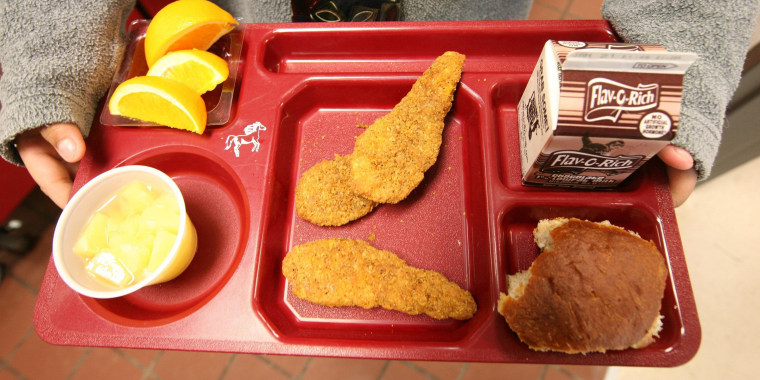A proposed ban on chocolate milk in New York City public schools has divided parents, lawmakers and dairy farmers across the state.
On Sep. 6, six members of Congress, including Rep. Grace Meng of New York, sent letters to the offices of Mayor Bill de Blasio and Department of Education Chancellor Richard Carranza voicing their "concern with the potential elimination of flavored milk in New York City Schools."
The letter, which was sent to TODAY Food by a representative from the New York Farm Bureau, outlined the "pivotal role" flavored milk plays in ensuring children receive nutrients like calcium, vitamin D and potassium.
The note cites a few studies (some of which were funded by diary producers) that claim children who drink flavored milks are more likely to get their daily recommended vitamin needs than "non-flavored milk drinkers." Those studies also showed no link between flavored milk consumption and weight gain in children.
Additionally, the letter argued that the move to ban so many milk products would adversely affect thousands of dairy farmers.
Will Mantell, a spokesman for the New York City Department of Education, would not specify when the initial ban was proposed but told TODAY via email that "it’s fair to say that we continuously review our menu options for nutrition & whether kids enjoy them."
While many young kids enjoy drinking chocolate milk, proponents argue banning it would be one way to limit the amount of sugar children consume. In the U.S., children eat three times as much added sugar as they should each day, according to the American Heart Association. To limit that number, the AHA issued a recommendation in 2016 suggesting kids should consume no more than six teaspoons of added sugar a day.
"Our priority is the health and well-being of our students, and every day, we offer a variety of healthy, delicious and free meal options that exceed USDA standards," Mantell said.
Mantell added that no New York City public schools currently serve soda and, when it comes to milk, only nonfat and low-fat options are served. Previously, Washington, D.C., San Francisco, Rochester, Minnesota, Los Angeles and Detroit have also voted to ban flavored milks, NBC New York reported. But Los Angeles and Detroit have since reversed those bans and sweetened milks are now served in schools again.
While New York City schools may be looking to ban chocolate milk, other districts around the country are looking for different ways to increase students' daily dairy intake. Several districts have recently accepted grants from different local dairy associations to set up coffee shops in high schools so teens can get some extra protein and calcium, albeit with a latte.
Some tweeters think the ban on sugar-laden drinks, even if they do contain calcium, is a great idea.
But many, many more are saying that banning chocolate milk is going too far.
Norma Reid-Archibald, a dietician and nutritionist with NYU Langone Hospital in Brooklyn, New York, said that chocolate milk is a good alternative for kids who may not want to drink plain milk.
“I need them to have another option — there’s calcium, vitamin D, potassium. All important,” Reid-Archibald told NBC New York. "Don’t worry about the sugar for this particular meal … because it’s a minimum part of their overall daily intake that these students are consuming."
While different brands may vary by calorie and sugar content, on average, chocolate milk has about 25%-30% more calories and double the sugar of plain dairy milk.
For example, a serving of Horizon Organic's low-fat chocolate milk contains 150 calories, 8 grams of protein, 23 grams of carbohydrates and 22 grams of sugar. Horizon's low-fat plain milk has 110 calories, 8 grams of protein, 13 grams of carbohydrates and 12 grams of sugar.
The future of sweetened dairy milk in New York City's public schools remains uncertain for now. Said Mantell, "No decision has been made about chocolate milk."


